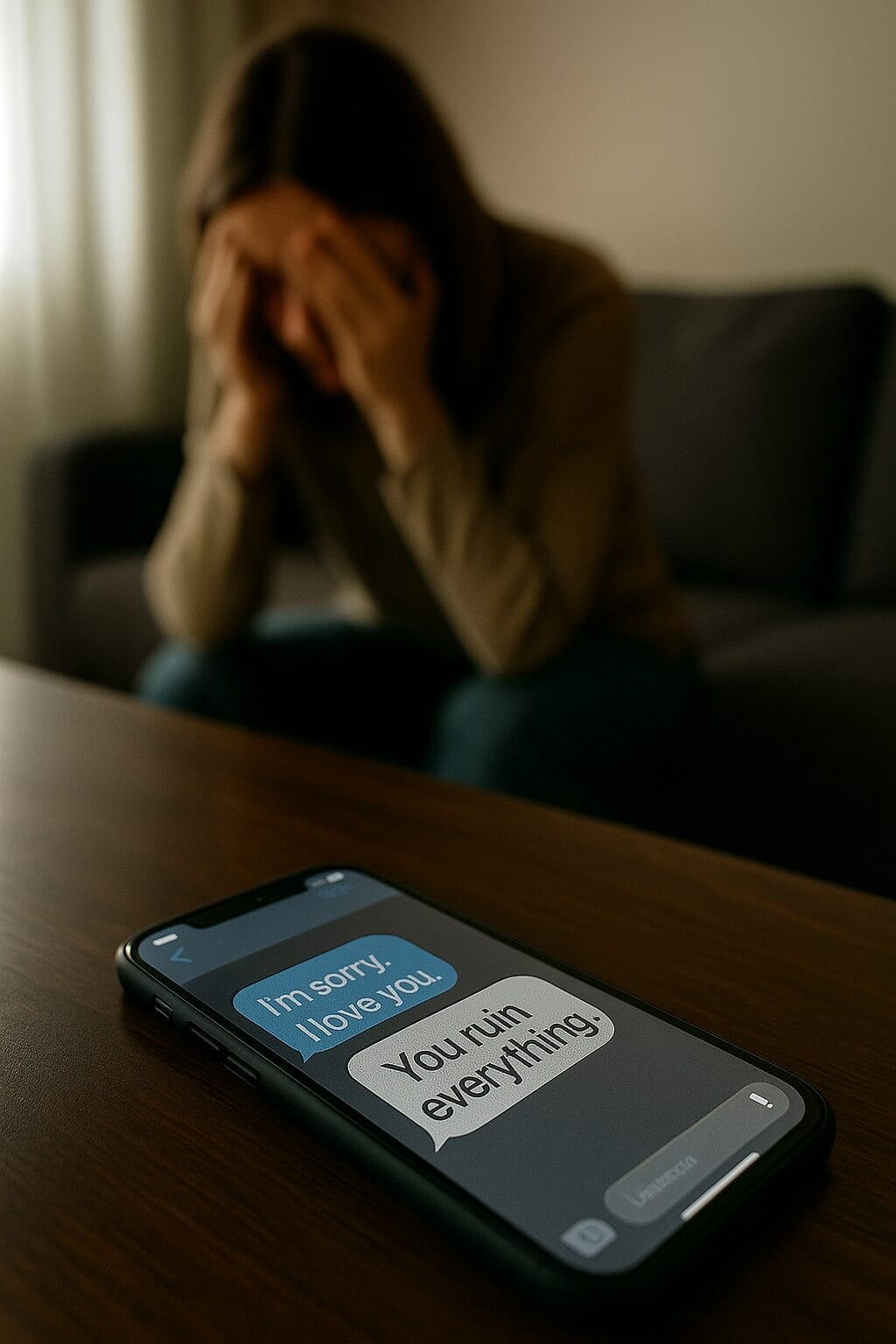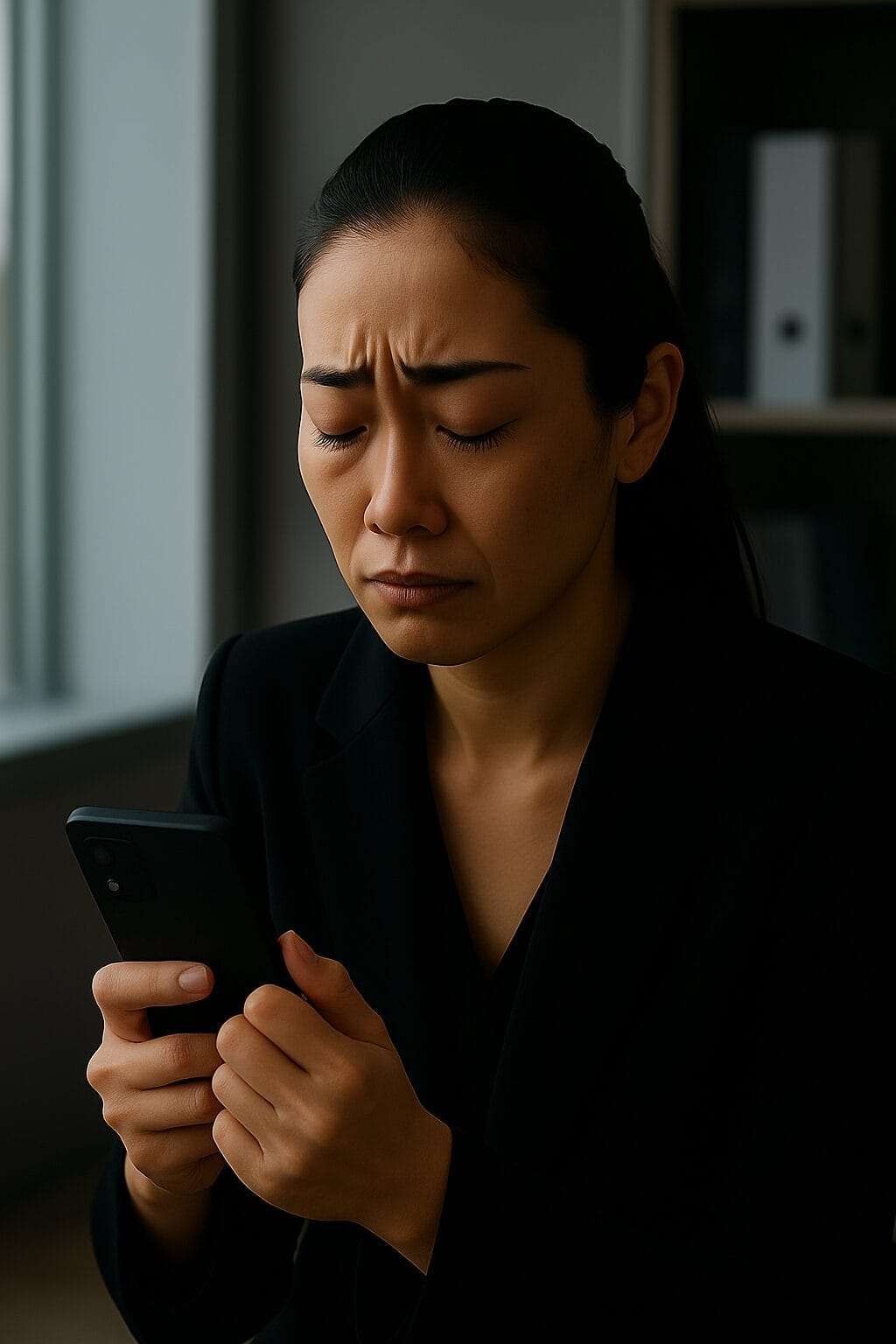
When Survival Masquerades as Love: The Hidden Truth About Trauma Bonds
- Updated: June 10, 2025
You drive a Porsche.
You manage teams.
You close deals that start with commas.
You know how to command a room, hold a strategy call, soothe a client in meltdown.
But this morning?
You stood in front of your bathroom mirror with a bruise you couldn’t fully conceal—not even with your $78 concealer, your lighting tricks, or your perfectly angled Zoom camera.
And what’s worse?
You still made excuses for him.
“It was just a bad night.”
“I pushed too hard.”
“He’s just stressed.”
“It’s not like he punched me (that hard).”
You’re not weak.
You’re not naïve.
You’re not codependent.
You’re trauma-bonded.
This post isn’t about women who can’t think for themselves.
It’s about women who’ve learned to think so strategically, they gaslight their own pain to survive love that isn’t safe.
You’re not staying because of history.
You’re staying because your nervous system was trained to confuse danger with intimacy—and now control feels like home.
Let’s name it.
Let’s end it.
🧭 What You’ll Find in This Post: When Love Feels Like Captivity
🧠 What a Trauma Bond Actually Is
(And Why It’s Not the Same as Romantic Codependency)
Let’s get this straight:
This isn’t about being needy.
It’s not about being obsessed.
And it’s definitely not about lacking willpower.
A trauma bond is what happens when your nervous system forms a deep emotional attachment to someone who hurts you just enough to keep you hooked.
Pain, followed by relief. Harm, followed by apology. Chaos, followed by “I love you.”
It’s not constant abuse. It’s intermittent reinforcement.
And that’s what makes it feel like love.
Your brain stops processing it as danger and starts interpreting it as intensity.
Which—if you grew up in an emotionally unsafe home—feels like home.

🧷 Why It’s NOT Codependency
Let’s break this down:
| Codependency | Trauma Bond | |
|---|---|---|
| Emotional Need | “I can’t feel okay unless I’m needed.” | “I can’t tell what’s real unless they tell me.” |
| Driving Force | Enmeshment, identity fusion | Psychological survival, threat-reward cycle |
| Feels Like… | Clinginess, over-helping, approval-seeking | Confusion, fear, obsession, withdrawal anxiety |
| Common Voice | “I need to fix this.” | “It’s not that bad.” / “I’m probably overreacting.” |
| Coping Strategy | Over-functioning to feel valuable | Minimizing harm to feel safe |
Codependency says: “I’m nothing without them.”
Trauma bonding says: “I’m unsafe without them—even though they’re the one making me feel unsafe.”
That’s not a partnership.
That’s captivity.
And if you’re a high-functioning woman reading this, I need you to hear this loud and clear:
You didn’t stay because you’re broken.
You stayed because your system was trained to survive, not to feel safe.
🧬 Why Trauma Bonds Feel So Real
(Even When They’re Wrecking You)
You know it’s bad.
You’ve cried in meetings, thrown up from anxiety, whispered “I can’t do this anymore” into your steering wheel.
But then…
He texts “I miss you.”
She plays your song.
You remember that one good week last March.
And suddenly, leaving feels too final.
That’s not love.
That’s chemical warfare disguised as romance.

🔹 1. The Hormonal Hijack
Your brain is wired to bond—even to harm.
Dopamine rewards the high of reconciliation, even if it follows pain.
Oxytocin bonds you during intimacy, touch, even after manipulation.
Cortisol rises in stress, making your body cling to the familiar—even if it’s destructive.
You’re not addicted to the person.
You’re addicted to the relief after the chaos.
And that’s what makes it feel like love.
🔹 2. The Cultural Conditioning
You were taught to romanticize survival.
“Ride or die” = devotion
“Staying power” = moral strength
“All couples fight” = excuse for emotional warfare
“Strong women stay and fix it” = gaslighting with a feminist bow
Our culture sells pain as passion.
Which means even when you’re hurting, part of you still thinks:
“Maybe this is just what love looks like.”
It’s not.
It’s just what your trauma was dressed in.
🔹 3. The Gaslighting Loop
This is where it gets cruel.
You bring up the disrespect.
They twist the facts.
You try to set a boundary.
They cry harder than you.
You finally explode.
And now you’re the abuser.
“You’re too emotional.”
“You’re overreacting.”
“I didn’t say that.”
“You always do this.”
Suddenly, you’re apologizing for being hurt.
Your mind spins, your gut clenches, and your clarity dissolves.
And just like that—you stay.
This is not weakness.
This is warped survival conditioning.
And it will have you defending your own destruction with spreadsheets, timelines, and “but he had a hard childhood.”
You don’t need more reasons.
You need to unhook the fantasy.
🏆 Why High-Achieving Women Stay (Even When They Know Better)
You’re not a pushover.
You’ve left jobs, cities, maybe even parents who couldn’t treat you right.
But this person?
The one who keeps disappointing, manipulating, hurting you in subtle or not-so-subtle ways?
You keep defending them.
Or worse—you keep defending your decision to stay.
Here’s why:

🔹 1. You’ve Been Conditioned to Perform Stability
You’re praised for your resilience.
Your logic. Your “grace under pressure.”
You know how to look okay when everything is falling apart.
So you assume that if the relationship is messy, you just need to manage it better.
You over-function because that’s what you’ve always done.
You stay because leaving feels like failure—and your entire identity is built on not failing.
“If I just communicate better…”
“If we get through this phase…”
“If I stop overreacting…”
This isn’t a communication issue.
It’s a conditioning issue.
🔹 2. Your Trauma Tells You to Stay Quiet, Not Safe
If you grew up in a house where love came with strings, silence, or shame…
You learned that discomfort is normal.
That speaking up is dangerous.
That suffering is part of loyalty.
So when this person hurts you, confuses you, gaslights you?
You don’t call it abuse.
You call it complicated.
You aren’t chasing love.
You’re chasing resolution for wounds you never caused.
🔹 3. The World Sees You as “Fine”—So You Doubt Yourself
You’re the stable one. The advice-giver. The calm friend.
You give TED Talk energy in a crisis.
So when things get bad at home, you think:
“If I was really in danger, I’d know, right?”
“People like me don’t end up in abusive relationships…”
But emotional abuse doesn’t come with a warning label.
And trauma bonds don’t just trap the weak.
They trap the ones who’ve been trained to question their reality—and keep showing up anyway.
You are not delusional.
You are not dramatic.
You are a brilliant, emotionally attuned woman—whose deepest instincts have been hijacked by a system that looks like love, but feels like loss.
And you are allowed to stop explaining your pain.
You are allowed to leave without permission slips.
You are allowed to choose peace over performance.
🪓 Breaking the Spell (Without Shame)
You don’t need a dramatic escape plan.
You don’t need to explain it to everyone.
You don’t even need to hate them.
You just need to name it.
And stop lying to yourself.
Because that’s where the bond breaks:
Not in the leaving. In the naming.

🔹 1. Say it out loud: This isn’t love. It’s captivity dressed as connection.
You’ve tried fixing it.
You’ve tried therapy, spacing out sex, better timing, more empathy.
But deep down, you know:
You’re not building something.
You’re surviving someone.
Say it. To yourself. To your journal. To your mirror. To a coach or therapist who sees you.
Let the words come without performance.
“I’m not safe here.”
“This isn’t what love feels like.”
“I’m not crazy—I’ve just been conditioned to call harm home.”
🔹 2. Detach from the fantasy
No one talks about this part.
You’re not just walking away from a person.
You’re breaking up with the illusion of who they could’ve been.
The hope that this time it might work.
The identity you built around being “the strong one who stayed.”
That’s grief.
That’s detox.
And you’ll probably miss them while hating them. That doesn’t make you weak.
That makes you a human with a nervous system trying to heal.
🔹 3. Rebuild your definition of love
Not the one built on movies or pain.
The one built on emotional sobriety.
Ask yourself:
Does this relationship honor my nervous system?
Can I speak my truth without being punished for it?
Do I feel peace, or just momentary relief from chaos?
Real love doesn’t feel like waiting to exhale.
It feels like being able to breathe all the time.
You don’t have to announce your exit.
You don’t owe anyone a dramatic arc.
You don’t have to justify why you’re choosing sanity.
Quiet departures are still liberation.
Clarity doesn’t need a mic.
❓FAQ: Yes, Girl—It’s Bad
Debunking the Bad Advice That Keeps You Stuck
Isn’t every relationship hard sometimes?
Yes. But not like this.
Hard doesn’t mean humiliating.
Challenging seasons don’t come with chronic confusion, mind games, or fear.
If you’ve started calling chaos “normal,” you’re not in a rough patch—you’re in a trauma bond.
👉 Want clarity on the difference?
How to Break Toxic Romantic Relationship Patterns (Without Repeating the Past)
But they didn’t hit me—can it still be abuse?
Yes.
Abuse isn’t always visible.
Gaslighting, withholding affection, financial control, and constant emotional withdrawal are forms of abuse.
You don’t need a bruise to be broken down.
👉 Read more on emotional harm that leaves no marks:
The Complex Connection: How Hormones Influence Our Persistence in Painful Relationships
How do I know it’s a trauma bond and not just emotional dependence?
Ask yourself:
Do I keep making excuses I don’t fully believe?
Do I feel like I’m losing myself trying to keep them calm or happy?
Does pain feel familiar—even comforting?
If yes, it’s not emotional closeness. It’s survival response.
👉 Learn how trauma bonds rewire you:
Loyalty Trauma Bonds: When Staying Committed Becomes Self-Betrayal
Should I try one more time before walking away?
Let’s be honest.
You’ve already tried—silently, constantly, at the expense of your peace.
If you’re asking this, what you really mean is:
“Will they ever become who I hoped they’d be?”
👉 Rebuild emotional strength before you go:
Building Emotional Resilience Before Leaving a Loveless Marriage
Am I stupid for staying this long?
No. You stayed because you were trained to.
To fix. To hold on. To see the best in people.
That doesn’t make you stupid. That makes you loyal. And trauma-bonded.
Now you’re waking up.
And that changes everything.
👉 For deeper validation and next steps:
Romantic Codependency: What It Is and How It Hurts
🫶 Final Thoughts: Loving Someone Doesn’t Need to Feel Scary
You weren’t in love. You were surviving someone.
You weren’t stupid.
You weren’t weak.
You weren’t addicted to drama.
You were trauma-bonded.
And the longer you stayed, the more your nervous system tried to make it feel safe—because that’s what trauma does: it distorts danger into devotion.
But now?
You’re waking up.
And that clarity is sacred.
You don’t need to wait for permission.
You don’t need another horrible night to prove it’s bad enough.
You don’t even need a villain to justify your exit.
You’re allowed to walk away from what’s familiar—just because it’s no longer okay.
And you don’t have to explain it to anyone.
If you’re ready to untangle the deeper patterns that trained you to call harm “love”—I’d be honored to walk with you.
💛 Work with me, Denise G. Lee – Together, we’ll break the emotional contracts that keep you in survival and build clear, honest strategies that support your healing.
👉 Explore coaching here
💌 Want grounded truth like this every week?
Get soul-sharpening insights and honest strategies straight to your inbox.
👉 Join the Friday Letter
🎙️ Prefer to listen while you breathe through it?
This week’s podcast goes deeper into how trauma bonds override logic—and what it takes to choose peace over performance.
👉 The Introverted Entrepreneur Podcast
And just in case no one’s reminded you lately:
You don’t owe your future to your past.
You don’t need to justify your peace.
You get to leave the cycle.
And you get to live differently.





